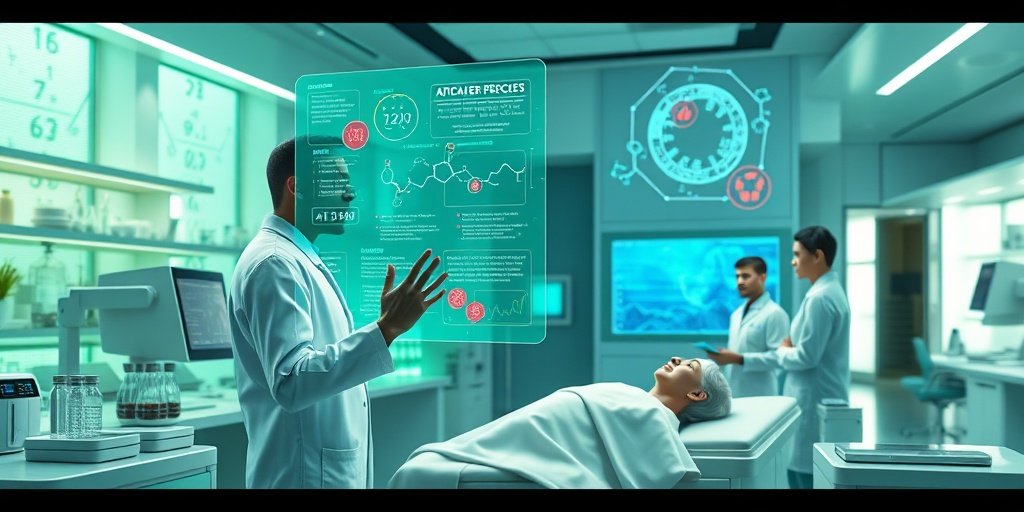⚡ Quick Summary
The study introduces ACP-EPC, an innovative deep learning framework designed for predicting anticancer peptides (ACPs) from protein sequences. This model achieved remarkable accuracies of 0.935 and 0.984 on two test sets, significantly outperforming existing methods.
🔍 Key Details
- 📊 Datasets: ACP135 and ACP99 test sets
- 🧩 Features used: Contextual representations from ESM-2 and handcrafted physicochemical descriptors
- ⚙️ Technology: Deep learning with a Cross-Attention mechanism
- 🏆 Performance: Accuracy of 0.935 and 0.984 on test sets
- 🌐 Accessibility: Publicly available web server at http://www.bioai-lab.com/ACP-EPC
🔑 Key Takeaways
- 💡 ACPs are a promising alternative to conventional chemotherapy, targeting cancer cells selectively.
- 🤖 ACP-EPC utilizes a pre-trained protein language model for enhanced prediction accuracy.
- 📈 The model’s performance significantly surpasses existing peptide prediction frameworks.
- 🔍 Cross-Attention mechanism allows for effective multimodal feature fusion.
- 🌍 The framework is designed to be user-friendly and accessible to researchers worldwide.
- 🧬 This research highlights the potential of AI in advancing cancer therapeutics.
- 📅 Published in Molecular Diversity, 2025.

📚 Background
Cancer remains a significant global health challenge, with traditional chemotherapy often causing severe side effects due to damage to healthy cells. In recent years, anticancer peptides (ACPs) have emerged as a promising therapeutic alternative, offering the potential to selectively target and eliminate cancer cells while improving patient quality of life. However, the traditional methods for identifying ACPs are labor-intensive and time-consuming, necessitating the development of more efficient predictive tools.
🗒️ Study
The researchers developed the ACP-EPC framework to streamline the identification of ACPs directly from protein sequences. By integrating contextual representations from the Evolutionary Scale Modeling 2 (ESM-2) with handcrafted physicochemical descriptors, the model employs a Cross-Attention mechanism for effective multimodal feature fusion. This innovative approach aims to enhance the accuracy and efficiency of ACP prediction.
📈 Results
The ACP-EPC model was rigorously evaluated using tenfold cross-validation and two distinct test sets, achieving impressive accuracies of 0.935 for ACP135 and 0.984 for ACP99. These results not only demonstrate the model’s superior performance compared to existing methods but also highlight the advantages of combining diverse feature representations in peptide prediction.
🌍 Impact and Implications
The introduction of the ACP-EPC framework could significantly transform the landscape of cancer therapeutics. By providing a more efficient and accurate method for predicting anticancer peptides, this technology has the potential to accelerate the discovery of new cancer treatments, ultimately improving patient outcomes and quality of life. The accessibility of the model through a public web server further promotes its use in research and clinical applications.
🔮 Conclusion
The ACP-EPC framework represents a significant advancement in the field of anticancer peptide prediction. By leveraging deep learning and innovative feature extraction techniques, this model not only enhances prediction accuracy but also paves the way for future research in cancer therapeutics. The integration of AI in this domain holds great promise for improving treatment strategies and patient care.
💬 Your comments
What are your thoughts on the potential of AI in cancer treatment? We would love to hear your insights! 💬 Leave your comments below or connect with us on social media:
ACP-EPC: an interpretable deep learning framework for anticancer peptide prediction utilizing pre-trained protein language model and multi-view feature extracting strategy.
Abstract
Cancer remains a major global health challenge, as conventional chemotherapy often causes extensive damage to healthy cells and leads to severe side effects. Anticancer peptides (ACPs) have emerged as a promising therapeutic alternative, capable of selectively targeting and eliminating cancer cells while improving patient quality of life and treatment outcomes. Nevertheless, identifying ACPs through traditional biological experiments is both labor-intensive and time-consuming. To address this limitation, we developed ACP-EPC, a deep learning framework which predicts ACPs directly from protein sequences. ACP-EPC integrates contextual representations from Evolutionary Scale Modeling 2 (ESM-2) with handcrafted physicochemical descriptors and employs a Cross-Attention mechanism for multimodal feature fusion. The model was rigorously evaluated using tenfold cross-validation and two test sets, ACP135 and ACP99, achieving accuracy of 0.935 and 0.984, respectively. These results substantially outperform existing models, underscoring the advantages of combining diverse feature representations. To promote accessibility, we have also deployed ACP-EPC as a publicly available web server at http://www.bioai-lab.com/ACP-EPC .
Author: [‘Lv J’, ‘Li K’, ‘Wang Y’, ‘Xu J’, ‘Meng Y’, ‘Cui F’, ‘Wei L’, ‘Zhang Q’, ‘Zhang Z’]
Journal: Mol Divers
Citation: Lv J, et al. ACP-EPC: an interpretable deep learning framework for anticancer peptide prediction utilizing pre-trained protein language model and multi-view feature extracting strategy. ACP-EPC: an interpretable deep learning framework for anticancer peptide prediction utilizing pre-trained protein language model and multi-view feature extracting strategy. 2025; (unknown volume):(unknown pages). doi: 10.1007/s11030-025-11352-x